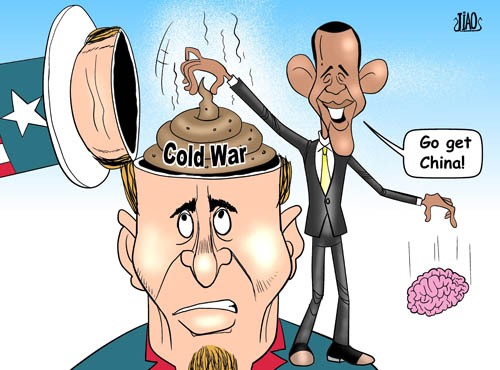China-US relations far from normalized
- By Shen Dingli
 0 Comment(s)
0 Comment(s) Print
Print E-mail China.org.cn, October 18, 2012
E-mail China.org.cn, October 18, 2012
The recent negative judgment by the U.S. Congress on China's two largest telecommunications companies doesn't seem to make economic sense. However, when political factors are taken into account, all can be understood.
|
|
|
The Cold War Mentality [By Jiao Haiyang/China.org.cn] |
In contemporary China-U.S. relations, similar to contemporary China-Japan relations, relations were not established on a truly normalized basis. The normalization of China-U.S. and China-Japan relations are a historical necessity because it falls in with popular demand. However, there was a third party to motivate the "normalization" of relations in the 1970s. The former Soviet Union's global expansion was applying pressure on both China and the U.S. Although China-U.S. and China-Japan dialogue included defensive rhetoric, the countries involved all somehow managed to reach out to each other and maintain relations.
The diplomatic relations established in this way run contrary to natural development. The so-called normalization in this case is just words and explains nothing. In fact, the normalized relationship between China and the U.S. is only skin deep. Else wise there would not be cases like the U.S. selling arms to Taiwan. How can such strained relations be "normal"?
After the collapse of the Soviet Union, the security factor which had once bound the three countries quickly disappeared. However, from a pragmatic approach, there's no reason to terminate established diplomatic relations. What's more, normalization is a process. China, the U.S. and Japan all realized that they can maintain diplomatic relations based on the existing framework. Sino-U.S and Sino-Japan trade has thrived in an era of globalization, although cooperation in non-traditional security fields remains difficult, especially when national sovereignty is at stake. U.S. influence can be seen everywhere in areas concerning China's core interests, including Taiwan, Tibet, Xinjiang, the South China Sea and the Diaoyu Islands.
How can China-U.S. relations be normalized when the U.S. does not respect China's core interests?
In this context, it's no surprise that Huawei and ZTE were kept out of the U.S. market. There is no real chance of China and the U.S. declaring war over the ruling (although it's theoretically possible). Now since the U.S. has stated it will support Taiwan and defend Japan's interests on the Diaoyu islands issue, it will not grant Chinese companies access to its ICT market. The various excuses Huawei and ZTE encountered from the U.S. Congress were not based in reality. Congress painted China as an imaginary enemy, and this is the ultimate cause of why the normalization of China-US relations remains stagnant.
Huawei and ZTE have business operations in India and many other countries. Despite its established "normal relationship with China, it has taken a defensive attitude towards China. India wanted to be critical of Huawei and ZTE, similar to what the U.S. is doing now. However, it made a compromise when it weighed carefully its security and economic interests. The U.S. could also learn to compromise. However, it will learn only after a shocking shift in the global balance of power, only when it realizes that force should be used only to defend its own sovereignty, instead of preventing other countries from protecting their territorial integrity.
This will be an era of post U.S. hegemony, but will take some time to realize. Huawei and ZTE have to be patient for that day to come. At the same time, we should research how many foreign brands, including U.S. brands, have been granted access to China's strategic infrastructure. We should make further note: since some of these countries have been preparing for a possible military conflict with China, how should we respond? If we do use other countries' equipment and software in our own communication system, what should be done next?
The author is a columnist with China.org.cn For more information please visit http://www.formacion-profesional-a-distancia.com/opinion/shendingli.htm
(This article was first published in?Chinese and translated by Li Huiru.)
Opinion articles reflect the views of their authors, not necessarily those of China.org.cn.






